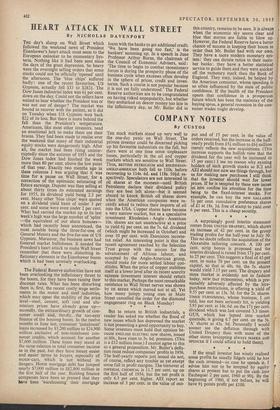COMPANY NOTES
By CUSTOS
THE stock markets stood up very well to the one-day panic on Wall Street. The private investor could be discerned picking up his favourite industrials on the fall, but there were at one time some unpleasant losses, particularly in the oil and copper markets which are sensitive to Wall Street. Thus, BRITISH PETROLEUM and RHODESIAN- ANGLO-AMERICAN both fell to 110s. before recovering to 114s. 6d. and 118s. 104d. re- spectively. Speculators are not interested in oil shares at the moment-until British Petroleum declare their dividend policy they are best left alone-but it seemed absurd to knock British oil shares down when the American companies were re- cently asked to reduce their imports of oil into the USA. Copper shares have become a very narrow market, but as a speculative investment Rhodesian - Anglo - American 10s. shares are not unattractive at a price to yield 63- per cent. on the 7s. 6d. dividend (which might be increased in October) and over 10 per cent. with Dominion income- tax relief. An interesting point is that the recent agreement reached by the Selection Trust group with the unions for the advancement of African labour, and accepted by the Anglo-American group, should make for more settled labour con- ditidns. When the price of copper stabilises itself at a lower level after its recent scarcity squeeze investment interest should return to this market. Perhaps the most remarkable resistance to Wall Street nerves was shown by DE BEERS Which moved not at all. Yet how many jumpy young men in Main Street cancelled the order for the diamond engagement ring on Black Monday!
• •
But to return to British industrials, a reader has asked me whether the flood of new issues which has depressed the market is not presenting a good opportunity to buy.' Some investors must hold that opinion be- cause ENGLISH ELECTRIC new shares, issued at 60s., have risen to 3s. 6d. premium. (This is a 2 million issue.) I cannot agree to this as a general proposition. Mr. Butler's defla- tion must reduce companies' profits in 1956. The half-yearly reports just issued do not, of course, reflect any trouble as yet except some fall in profit margins. The turnover of IMPERIAL CHEMICAL is 11.7 per cent. up On the first half of 1954, but the net profit is only 6.3 per cent. higher. AEI report an increase of 3 per cent. in the value of out- put and of 15 per cent, in the value of orders received, but the increase in the half- yearly profit from i54 million to £64 million merely reflects the new acquisitions. (This increase supports the bullish view that the dividend for the year will be increased to 15 per cent.) I see no reason why existing holders of such growth stocks as ICI and AEI should not now see things through, but as for making new purchases I still think that the investor should wait for lower prices. If he is tempted by these new issues let him confine his attention for the time being to the fixed-interest stocks. For example, he can buy the new GALLAHER 54 per cent. cumulative preference shares of 1 at 18s. 3d. free of stamp to yield over 6 per cent. This is a cheap security.
• •
A surprisingly good interim statement comes from UNITED DRAPERY, which shows an increase of 42 per cent, in the group trading profits for the half-year to July 30. This no doubt reflects the acquisition of the Alexandre tailoring concern. A 100 per cent. scrip bonus is proposed and the interim dividend is raised from 174 per cent. to 25 per cent. This suggests a final of 45 per cent, to make 70 per cent, on the present capital, so that at 48s. 9d. the 5s. shares would yield 7.15 per cent. The drapery and store market is evidently not in fashion today. NEW DAY FURNISHING, which is pre- sumably adversely affected by the hire- purchase restrictions, is offering a yield of 9.55 per cent. at 13s. 3d. for the 2s. shares. TIMES FURNISHING, whose business, I am told, has not been seriously hit, is yielding 5.95 per cent. at 14s. 6d. on the 174 per cent. dividend which was last covered 3.3 times. GUS, which has lapsed into market quietude, is giving 6.7 per cent. on the 5s. 'A' shares at 43s. 9d. Personally I would sooner see the deflation through with United Drapery than with most of the other stores (excepting always MARKS AND SPENCER if I could afford to hold them).
• If the small investor has wisely realised some profits he usually fidgets until he has the cash invested-in case he spends it. advise him not to be tempted by equity shares at present but to put the cash into Exchequer 2 per cent. 1960 at 90+. By the beginning of 1960, if not before, he will have 94 points profit per £100.


































 Previous page
Previous page